Menu
Table of contents
One article has 60+ tips with 30 tips that are useless and another article has 15 tips, but again misses the most important information.
So I thought it was time to put up THE ultimate list. One that is better than all the others.
Tip #1: Complete (or request) your Google My Company.
Google My Business is the block you see on the right when you google a business name. This block makes you much more visible nationally and locally within Google.
Check it out!
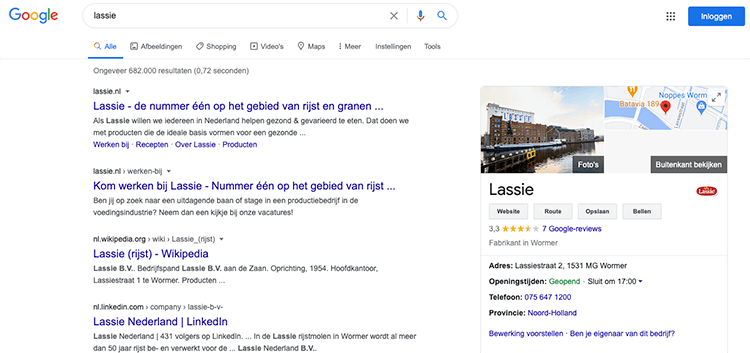
The block is primarily shown by company name, but in certain cases can also be shown by keyword. The image below shows that, too.
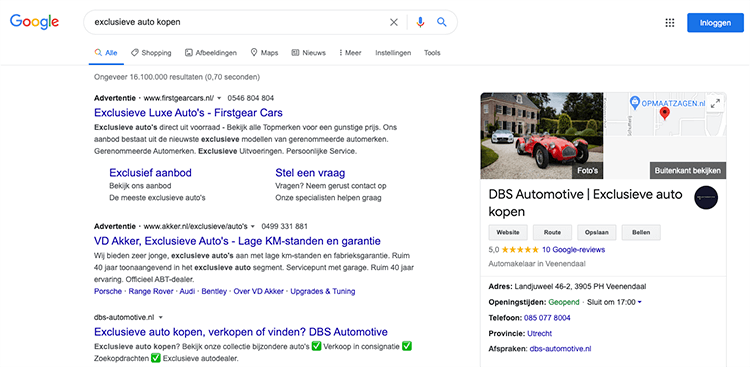
Your Google My Business is the perfect place to share contact details, business hours and other business information with leads, customers and, of course, Google. Besides the fact that having a My Business can increase your visibility, it will also increase the number of visitors to your website.
After all, people can click through with the click of a button. Should you want to know more about Google My Business or want to know what all you can add, I recommend you read my blog called "Google My Business: 8 most important features at a glance [2021]."
Tip 2: Make sure each page has a tantalizing meta title and meta description
When you walk down a shopping street, all the billboards, signs, gables and flags make your store stand out and make people walk in.
The meta title and meta description can be seen as the signs, flags and facades of the digital shopping street within Google. In other words, your meta title and meta description need to stand out enough and excite enough to make people click on your search result and continue to your website.
If your metas are not interesting and if they do not stand out enough, no one will click through. And that's a missed opportunity.
Now do you want to know how to write the perfect meta description? Then read my blog, "Meta description: how to optimize the meta description?

Tip 3: Start blogging (and stick with it)
Blogging in itself has an awful lot of advantages. It helps you learn more about the subject, it makes you an authority, it provides content for other channels, but most of all, it improves your findability in the search engines.
This is because you can very easily incorporate keywords into blogs. This is because blogs are often longer pieces of content in which you can go into great depth and name specific topics.
And the keywords that fit that, those are the long tail keywords.
The more findable you are on keywords and long tail keywords, the more clicks you will receive.
If by now you are still not convinced of the power of blogging, you should read my article "9 reasons why you should have already started blogging!".
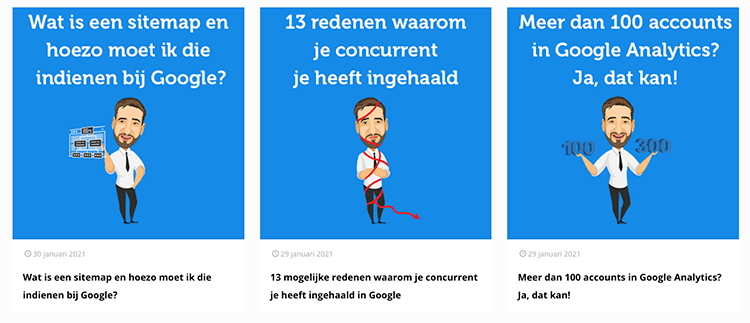
Tip 4: Write guest blogs for other websites
You now know that blogging improves the findability of your website. So when you start guest blogging, it ensures improved findability of the website you blog on.
Now you may be thinking: why would you want to blog on another website? Well, when you write a good piece you will build authority as an author, you will receive comments and people will click through to your website.
So guest blogging can directly ensure that you get clicks to your website. Especially when the blogs are widely read like on Marketingfacts and Frankwatching (in my case).
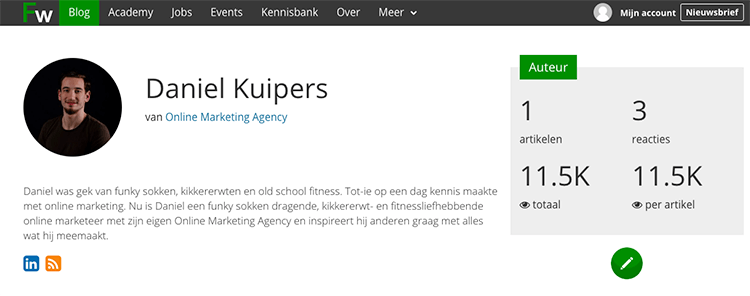
Tip 5: Write landing pages based on keywords (pay attention to long tail keywords)
When you have come up with a cool topic for a blog, you can of course look for a keyword to go with it. But what if you have come up with a keyword that is not informative and therefore does not really fit your blog?
For example, consider a keyword like online marketing agency Veenendaal. For those kinds of terms, you want to write a page focused on conversion.
And this is also called a landing page. Besides writing blogs, writing landing pages is also an important part of SEO and thus a good strategy to increase your findability and the number of visitors your website has monthly.
Tip 6: Find out competitors' best-scoring content and write texts accordingly
We have now discussed two ways of creating content:
- Writing a blog and finding a keyword to go with it
- Finding a keyword and writing a landing page for it
But there are other ways to get good keywords. In fact, you can use the right tools to find out competitors' keywords. And with those tools, you can also find out the best scoring content.
This is the content that provides the most visitors to your competitor's website. Currently, SEMrush is my favorite tool that allows you to do this. Within the "organic research" feature, there is a heading called "pages. There you will find the best scoring content from the domain you entered.
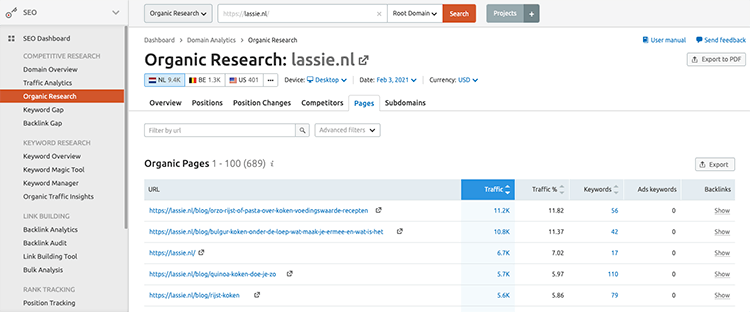
Should you want to know 6 more ways you can find out keywords of competitors, read my article called "6 ways to find out keywords of your competitors.
Tip 7: Make sure your website is technically sound
As you know, SEO consists of three pillars:
- Technology
- Content
- Authority
We have already talked about most of the second one and we are going to talk about the third one. For now, I want to zoom in on the first one. Namely, the technical state of your website.
When we talk about the technical state of your website, we're not just talking about things like load time, but also HTTPS, noindex, sitemap, robots.txt and a whole list of other important components.
Unfortunately, I can't explain to you in a few paragraphs what all you need to pay attention to, but I can tell you what are the most common technical SEO mistakes and what are the best technical SEO tools.
If you've read those two blogs, you've come a long way with technical optimization!
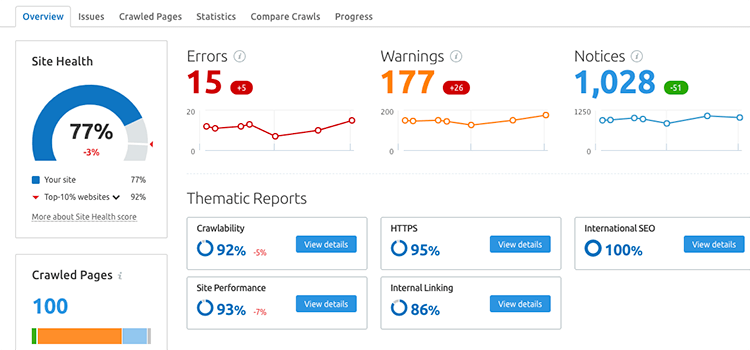
Now you may be wondering: how, for example, can your website loading speed affect your website traffic? Well, when your website is technically sound (and your content and authority are also good) Google will rate you better.
And so you're going to rank higher. Resulting in more visitors.
Tip 8: Find out and correct errors coming from Search Console
Tip 8 ties in seamlessly with tip 7 and also has to do with picking up technical areas for improvement.
I pulled this one separately from tip 7 because Google Search Console deserves it. After all, it is one of the most important SEO tools out there. With Search Console, you can:
- Submit pages to Google
- Submit sitemap to Google
- Finding out your website's performance within Google
- Cover errors and review your site vitality.
And especially the latter is important! After all, you can see exactly what technical problems there are within your website and what needs to be addressed immediately.
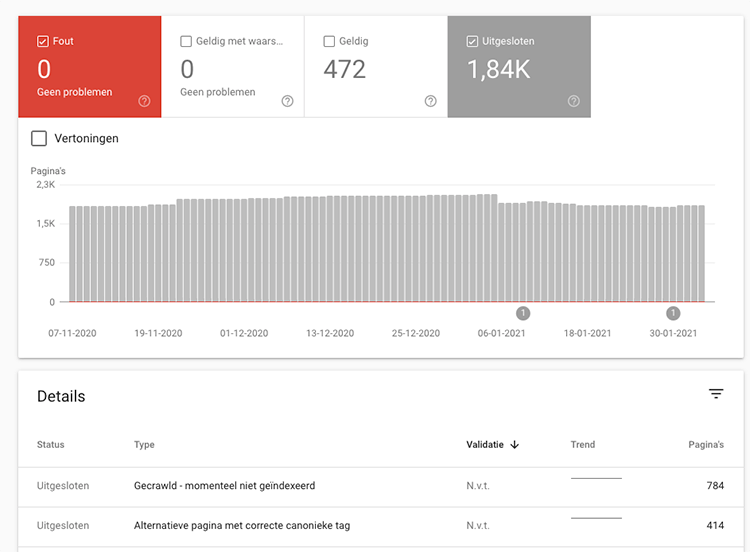
Does your website not have Search Console yet? Then you can find out how to create Search Console here.
Tip 9: Always make sure all on page SEO elements are in order
I told you earlier that SEO consists of three pillars. But there is another division you can make within SEO. Namely:
- On Page SEO
- Off Page SEO
When we talk about Off Page SEO we are talking about everything that happens outside your website/page. For example, think about link building. When you talk about On Page SEO, it's about everything that happens on your page.
Consider:
When you optimize all On Page SEO elements based on keywords, your pages will become more findable. And that means you will get more visitors to your website.
Want to know exactly what all the On Page SEO elements are and how best to optimize them? Then read my article "On Page SEO: complete explanation to rank high in Google."
Tip 10: Ask others to link to your website
Link building has been mentioned often enough in this article by now, but do you actually know what it means? Link building is nothing but getting links from other websites to your website.
When we talk about link building, two things are important:
- Quantity (you want to get as many links as possible)
- Quality (you want to get the best links)
In other words, you want to obtain as many good and valuable links as possible. And why exactly? Well, Google likes it when a website has a lot of good links. After all, that's a signal that the website has valuable information and is relevant.
And when Google thinks you are doing well and are relevant to your target audience, Google is going to rank you higher in search results.
So a very concrete action point for you: ask if relevant partners, friends, businesses and websites want to link to you.
Tip 11: Find out links from competitors and make sure you get them too
Besides asking partners for links, there are many other ways to get links to your website. And one of those ways is "nicking" your competitors' backlinks.
There are very many tools on the market that allow you to find out the links of every website out there. In those tools you can put the URL of your competitors and see where all the links are coming from. Then you can do everything you can to get those links as well.
In fact, you can contact all those parties to ask if they would also link to you. Some may do so without consideration, but some will also ask for consideration.
That may be:
- A fee
- A link back
- Or some other consideration
It is then up to you to determine if that is worth it. My favorite tools for finding out backlinks from competitors are currently Ahrefs and SEMrush.
Should you want 8 more tools that you can use to check backlinks, I suggest you read my article 10 best tools for backlinks checking [Free & paid].
Tip 12: Make sure your internal link network is in order
I just explained to you that Google likes it when you get a lot of links from external websites, but did you know that Google also likes it when you have a lot of internal links?
This is also called internal link building. The more relevant links your website has and the better the internal link structure of your website is, the easier it is for Google to rate everything and the easier it is for Google to know where what is.
And when Google can find and rank your pages better, that means your content and technology will come out better. And that, in turn, means your pages will rank higher in Google.
Tip 13: Make sure your pages do not compete internally with each other
I see Google as a ranking. The person who does best is ranked No. 1 and is the winner. I see this as a constant competition.
But did you know that your website can also compete internally? I don't think so. Let me explain this using the World Cup as an example.
In the end, only 1 team can win the World Cup. Or in other words, in the end, only 1 website can be at the top of Google. But within the countries that participate, there are many players who want to make the selection.
Only the best players will be on the team. And when that team wins, then that team is the winner of the World Cup.
The players within a country can be compared to the pages within your website. Not everyone can be a striker and not everyone can be mid-mid. This will basically be 1 player.
When you have two mid-mids on field, it's not going to go well. The two may be more concerned with each other than with the match. After all, they occupy the same position in the field.
And the same goes for your pages. When you have two pages competing for the same keyword, it's not clear to Google which one is really best suited to rank for that keyword. So that can also mean that both pages don't rank well.
Therefore, always ensure focus within your pages and make sure there is only one real page for each keyword that you want to rank with.
Tip 14: Start a knowledge base
Currently, Online Marketing Agency is organically the best findable marketing agency in the Netherlands. And no, this is not entirely due to the 200+ online marketing related blogs.
That's 90% because we have the largest and best findable online marketing knowledge base we have.
On keywords such as marketing or KPI, we are in the top 3.
This currently brings more than 60,000 visitors a month to our website. And that's huge.
Within your niche, you can also become the authority of the market by (first) writing a knowledge base based on keywords that do not belong/fit your blogs, landing pages or other pages.
After all, you don't want to compete with yourself. After all, I explained that to you in tip 13.

Tip 15: Update existing content
Writing a blog takes two hours for some and half a day for others. Both persons will agree that it is a precious thing.
But you shouldn't just focus on writing new blogs. After all, your existing blogs are also a gold mine. Especially the blogs that are not in the top 10. You can very easily boost those by updating, expanding, optimizing and improving them.
Then you might just go from spot 12 to spot 3. And that means your blog could go from no traffic, to dozens or even hundreds of visitors per month/day.
And that by spending an hour on something you've written before.
Nice and easy.
Tip 16: Ask if other people want to guest blog on your website
By now you are already well informed about why writing and posting content is good for the findability of your website. You can do this yourself, or you can ask others to do it.
This is also known as guest blogging. In exchange for blogging, the person who wrote the article often wants a link back. So that's a win-win for both of you.
Some get free content and others get free links.
Tip 17: Make use of structured data
Structured data I really see as an advanced SEO technique. It's not something you turn on with a checkmark, it's not something you'll fully grasp in a morning, and for implementing it you'll need some technical knowledge.
What exactly is it? It's nothing but a piece of code wrapped around a piece of content to make it viewable to Google.
Think of the review stars you used to see a lot in Google, breadcrumbs, sitelinks or products. Here is a simple (old) example.

But then how does structured data drive more visitors? Well, that's actually quite simple. Structured data ensures that you can be found more often and better in Google and that you grab more space in search results.
This makes it more likely that people will click on your search results and eventually land on your website.
Want to know what forms of structured data there are, how to add structured data to your website and what impact structured data has on voice search? Then you should read my little blog "What is structured data and how can you optimally use structured data?".
Tip 18: Make sure your website is usable on all devices
I personally think this is a giant open door, but since I encounter websites on a weekly basis that are not decently usable on every device, I have to mention it.
You probably recognize it. You open a website on mobile and most of it is off-screen. Or you open a website on your tablet and everything is crooked.
In both cases, people will immediately leave your website and thus Google will also rate your website poorly. In fact, Google has plenty of tools to measure whether your website is usable and works properly on all devices.
If not, you will get demerits for that. And that's not very good for your findability....
Tip 19: Share figures / insights from the market that no one has
Of course, there are plenty of topics you can write about within your niche. Most interesting topics are often figures and/or insights within your product or market that no one has.
That content sets you apart from your competitors. Especially when they can never get this content either. Then you have gold in your hands.
This type of content can be industry figures, results of a survey you've done and more.
You can then incorporate that information into a blog, an e-book, a white paper, a LinkedIn post, an email or even better: a combination of all these content forms.
Ps. It can also be content that you already have now, but your competition doesn't yet. Even then, you need to be on the cutting edge and share that content as quickly and as much as possible.
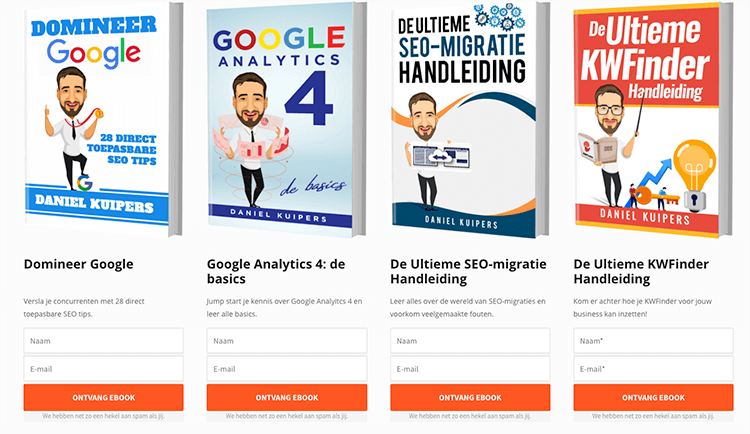
Tip 20: Don't forget Bing (and other search engines)
When we talk about search engine optimization, we are actually talking about Google optimization. So not SEO, but GO :-).
Google rules today and provides the vast majority of visitors, conversions, leads and clicks to your website (if we are talking about the various search engines).
But there are also smaller search engines, like Bing, that you can use to score traffic to your website as well. In fact, Bing also has its own Search Console called Bing Webmaster Tools and its own counterparts of Google My Business and Google Ads.
And with those handy tools and capabilities, you can also use Bing to attract traffic to your website. Does this mean you should now ditch Google and switch to Bing?
No, you don't. But should you already be pretty far inside Google, spend an afternoon or day on Bing to see what the options are there and where the areas for improvement are there.
Especially if you focus on other countries besides the Netherlands.
Tip 21: Use Google Posts
A Google Posts is a type of blog post within your Google My Business page. It allows you to share any of the following types of content very easily:
- Blog
- Elements
- Offer
- Product
The Google Post is placed in the Google My Company block that people see when they google your company name or enter any other search term that shows your My Company.
Thus, this causes your My Business block to become many times larger, thus grabbing more space in search results. This increases the likelihood that people will click on your content.
Should you want to know all about Google Posts, how to create a Google Post and want some additional handy tips for your Google Posts? Then I advise you to read my blog "What is a Google Post and how can you as a business owner use it?".
Tip 22: Respond to relevant blogs
The effectiveness of responding to blogs has declined dramatically over the last 5 to 10 years. Blogging is still incredibly powerful, but with the advent of podcasts and video marketing, you see that there is simply less interest in blogs. So that's where that decline is coming from.
The other side of the story is that blogs will not disappear in the next 10-15 years and there will always be a group of people who prefer to read rather than listen or watch.
So responding to blogs will still be of interest to you in the coming years. By responding to other people's (popular) blogs, you make sure that you come up more often. People will recognize your name, they will google your name or maybe even click directly through to your website by clicking on your name.
And when people see you come by first under a blog, then see you on LinkedIn and they also come across you in Google, you're totally winning.

Tip 23: Offer new content directly in Search Console
When you publish a blog or other page, Google doesn't take it right away. Think of it as a package you want to send. You wrap the package, put it on the table and hope the package magically arrives.
That's not going to happen.
Your content must therefore be offered to Google. You can think of this as picking up and sending the package. Only then will it arrive!
When you don't offer your content, it can take hours, days or (if you have a poorly findable website) weeks for Google to pick up on your new piece of content.
So you need to let Google know you have new content by offering it. And you do that offering with Google Search Console.I explain it in my blog "Why your blog doesn't show up in Google right after publication."
Tip 24: Be active on social media (business and personal)
The first 23 tips of this article were mainly about SEO, Google and search engine related tips. It is now high time to let go of SEO for a while and look at other methods and techniques that will ensure your website gets more visitors.
We'll start with social media. Using social media is a great strategy for achieving more free reach and brand awareness.... You can think about channels like
Within some of these channels you can create a business page for your company, but where social media is especially strong is in private use.
And now I'm not talking about sharing vacation photos or cat videos, but building your personal brand by being active on social media.
On LinkedIn, for example, I share weekly content about online marketing and about the development that OMA is going through. That kind of stuff topics my family and friends, as well as potential clients, find cool to read.
After all, social media is all about interaction, attention and the human factor. That's why I really firmly believe in building a personal brand. It's something that will benefit you throughout your life.
Both as an entrepreneur, and as an employee.
In the social media posts you make, you can incorporate links to your website. And in your profile, you can often incorporate a link as well. So it can also provide additional traffic.
But that should never be the main goal. The goal is always to provide value. Because the more value you offer, the more you get. And the more you're seen and liked, the more business you're going to bring in.
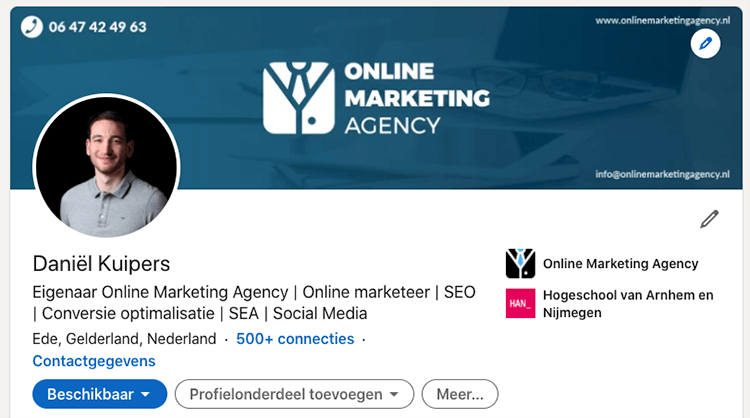
Tip 25: Start social media advertising
We continue on the social tour. The big advantage of becoming more findable organically is that it's free. The more time and energy you put into it, the more followers you get.
But what if you don't have that much time? Or if you don't want to put in that much time? Then social media advertising is a good idea.
Especially if you know well who you want to reach and if you know well what you want to convey. Therefore, these are the main pillars of social media advertising:
- Your targeting
- The content you want to share.
Targeting and content are the two basic ingredients you need for effective social media advertising. In the ideal situation, you do both of them yourself, but you can always outsource either one.
Before you start advertising, you should carefully consider what your objective is. For example, do you want to re-engage people who have bought from you before? Or do you want new leads for your funnel?
Depending on your objective and your target audience, you can choose your channel.
Tip 26: Make use of hashtags on social media
Hashtags are a great way to look for a particular niche, topic or group within social media. Think #football #marketing #SEO #traffic or #visitorstoyourwebsite.
As people search on the hashtags, this can bring traffic to your social media channels. If you use the right hashtags tags, people searching on the hasthags will come to you.
Then it's only up to you to make sure they stick around or click through to your website.
The most important tip I have for you when it comes to hashtags is to choose the right ones. Don't just pick a few, but research which ones are used a lot and also find out if it is your ideal target audience using them.
Tip 27: Start with video marketing
When you talk about more visitors and a large network, the rule of thumb is that, above all, you need to be more visible. In other words, you need to share more content.
Content can come in the form of a beautiful photo on Instagram, a dyke of a blog on your website or a really fat video on YouTube or Facebook.
You can share this video on all your platforms, which ensures that you therefore have content for all your channels. And that's going to ensure that you're more visible.
The big advantage of video marketing is that you can show much more than if you post a photo or a blog. Just moved into a new building? Make a video of it. Then people will see exactly what your new location looks like.
Have you written a manual on a particular tool? Make a video about how to use the tool.
Should you focus mainly on YouTube and want your YouTube videos to be more findable? Then you should read "YouTube SEO: Roadmap for making your videos more findable within YouTube."
Tip 28: Get started with retargeting (Google and social)
I already mentioned retargeting in the tip on social media advertising, but it is such an important part of online marketing that I chose to pull this tip loose as well.
Retargeting is nothing more than reaching out to your website visitors again to bring them back to your website. For example, you can set it up (very simply) to show people a banner from you when they have been on your website, but you can also make it more complex by showing people specific content because they have previously viewed a certain page.
You can make it as complex as you want. Retargeting works for both B2B and B2C. After all, when someone has ordered toothpaste on your website, you naturally want to show another ad after a certain period of time (when the toothpaste is probably running low) and realize a new purchase.
And when someone has viewed your campaign page for your course, but hasn't converted, you also want to make that person another offer to make sure they still enroll.
Should you want to get started with retargeting, the LinkedIn Insights Tag and the Facebook Pixel are hugely important. Especially if you display your ads through social media kanalan.
Tip 29: Start email marketing (newsletter)
If you do not have a good findable website, not many followers on social media and not that many people know you yet, starting email marketing is not very useful.
But when you already have a few hundred visitors on your website and you have some followers, email marketing is a great channel to get people to your website for free.
Email, in fact, is a unique channel. It is the only channel where you can reach people for free by actually pushing something to them, without the interference of another platform.
When we talk about Facebook Ads, you have to pay to push your message and you depend on Facebook itself. With email, that's not the case.
The only competition in e-mail is yourself and are the other e-mails. You have to make sure people open your emails and click through to your website.
Because email is free (and so is SEO), I always say those are the two most important channels for any entrepreneur. After all, if you spend 0 euros on advertising and can build your business on that, you are winning.
This is because then you don't run a risk if something happens within your market, and then you don't have to immediately slash budgets (and thus lose business) when there is an economic crisis.
And should you really want to hit the gas, just get started with advertising and retargeting or any of the other tips.
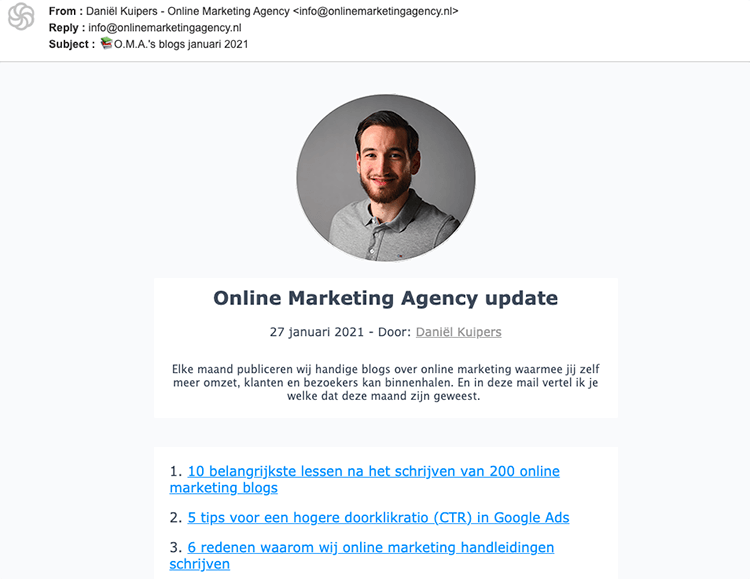
Tip 30: Start a podcast
If you start podcasting, listeners and website visitors are not going to fly around your ears. No, they won't.
But what podcasting is great for is building your personal brand. Something I mentioned earlier in this article. You see, during a podcast you can really showcase who you are, what you can do and the story behind your business.
And when you do that well, you keep it up and your podcast gets more and more listeners, then you will build a piece of authority. If you're always talking about SEO and people start to see you as the SEO guru, then they'll think of you when they want to do something in terms of SEO.
Or when they hear their neighbor say something about SEO, they will mention your name. And that's going to cause more people to know you, like you and ultimately increase traffic to all your channels.
But, of course, the same goes for several of the tips from the she list. Online marketing is nothing but cross-pollination. Website visitors you want to turn into newsletter subscribers Facebook followers you want to turn into podcast listeners in order to turn them into ambassadors of your brand or company.
That's just the way it works.
Tip 31: Capitalize on new trends and developments (TikTok, Clubhouse)
The channels I have all mentioned so far have all proven themselves in recent years. But there are also channels that have yet to do so.
As I write this article, TikTok is already a powerhouse and Clubhouse is just starting to gain feet in the Netherlands. In this case, these are social media channels, but it could just as easily have been and other channel.
It is always a risk to constantly get into the newest thing. After all, there's a good chance it's not going to be it. But it also has huge advantages. If you are one of the early adopters in a channel and you can gain a lot of followers.
Then you have a huge advantage over the rest. This is because it is easier to become big on a platform because you are there early. After all, you have less competition then.
Tip 32: Create a useful tool that people need
This is one that we are working on ourselves. After all, people may visit your website because you have good content on your website and therefore you are easily findable.
But there are also other features you can add to get more visitors. Take for example a retirement calculator, a free keyword tool, a program to track your positions in Google or anything else that your target audience needs.
When you add this functionality to your website, people will come to your website specifically for this. They will do so once, maybe twice, but they may also come back every week.
And you want that, of course.
Tip 33: Create likeable and shareable content such as e-books, white papers, infographics, etc.
Likeawhat and shareawhat? Likeable and shareable! In other words, fun content that catches on and people want to share. I told you before about sharing industry figures that no one has.
But of course, it can also be numbers that people do have, but that you package in a convenient or fun way. Take for example the e-book I just wrote called Google Analytics 4: the basics.
I posted a message on LinkedIn about this and over 150 people wanted the e-book. That got me 150 more connections and many people started reading my e-book.
As a result, people will start to know and recognize me. When I pass by again, they will start reading my content again. Because if you've written a good e-book, people are going to remember you.
They may be thinking: hey, I'm going to read some of his blogs. Or maybe even better: I don't understand anything about Analytics 4 and online marketing, I'm going to outsource it.
Tip 34: Make use of (micro) influencers
When we talk about influencers, I feel like with one group the neck hairs stand up and the other group thinks it's great. I don't feel like there aren't many people in between the two camps.
And that's a shame.
Sure, it's cool when one of the biggest social media personalities in your industry promotes your product, but what I believe in much more are micro-influencers.
In other words, influencers with a smaller reach. And by that, I don't just mean someone on Instagram with only 10,000 followers. No, I also mean someone who buys some shakes at Body and Fit and has their own personal code that they can share with their friends so they all get a little discount.
After all, that is also influencer marketing.
Tip 35: Be active in the right communities (Facebook groups, forums, Reddit, etc.)
I didn't originally have this tip in there, but this idea came to me while listening to a podcast. And car dealer from America was a guest on Gary Vaynerchuk's podcast.
He said they were mostly active locally. They placed articles in the newspaper and advertised locally on social media. But what really stuck with me was the following:
In one of the local Facebook groups, there was a call from a sad mother. Namely, someone had scratched her son's car and she asked if anyone had seen anything.
What did the car dealer do then? They offered to repair the scratches for free because they thought it was so pathetic.
This earned them an awful lot of goodwill, positive feedback and customers. And now I am not saying that you should also start giving away your service for free now, but I am saying that you should be active in the communities that fit your niche.
Do you sell padel courts (the sport that is gaining ground in the Netherlands)? Be sure to join a Facebook group about padel and offer tips on maintaining a padel court on forums, for example.
This is another free way to get a lot past your target audience without spending a single dollar on marketing.
Tip 36: Answer questions on Twitter, Quora, Medium, etc.
Twitter has been extinct for me personally for years, but when I think of Twitter I always have to think of a story told by an acquaintance.
That acquaintance had a specialty. After all, he had a small construction company. Once on Twitter, a question came up asking if anyone had time to take on a small job.
He had time at that moment, decided to respond and went to work on the job. A week later he received a call from his client, who gave him another job.
And another job. And another job. And another job.
In this case, a single tweet on Twitter resulted in years of work and tons of sales. Of course, this is an extreme example, but answering questions on, say, a Twitter or Quora can cause you to get more customers.
Or that people start to see you as an authority within your field. Or that people want to know more about you and start visiting your website, for example. It's all possible.
Tip 37: Become a guest on other people's podcasts
I mentioned earlier that in addition to blogging, you can also guest blog. And now I'm going to give a similar tip on podcasting.
Besides starting a podcast, you can also be a guest on someone else's podcast. He then has a nice guest with whom he can record a podcast and you have a piece of exposure on his platform.
Win-win in other words!
Tip 38: Create a free course or training
It doesn't really matter what you put behind the word free, because the Dutch love free. Whether that's free bananas at Picnic, the can of Fanta given away on the street or the course you made.
You can put that to good use for your business. A free bait always does well. I told you before that a free e-book can do well, but a free course or training works even better.
In fact, I am 100% sure that a free training course on Google Analytics 4 would have done even better than my e-book. Why I didn't? Because an e-book is easier for me to create and I don't necessarily need to get customers and visitors through a free course or training.
Tip 39: Make use of QR codes on packaging or at events, for example
This is another one of those tips that you won't see in any other list of ways to get more traffic to your website, but is very valuable. Suppose you have a product that is running well.
When you put a QR code there, people will scan it. You can control where people end up when they do that. So you can redirect them to your website.
But what about an event or a festival? There, too, you can use a QR code to gather reviews, direct people to an action page or show them a video.
If you already work with QR codes or want to start doing so now? Then read my blog "What you absolutely must not forget when working with QR codes".
Tip 40: Make use of browser notifications
A year ago, I started an experiment by using browser notifications on our own Web site. When people first joined my website, they were given a notification with whether they wanted to receive notifications.
After a few months of testing, I had gathered hundreds of people who received the notifications and clicked on them to go back to my website.
Since I didn't want to make a carnival of my website, I decided to stop browser notifications the moment I started the pop-up.
We then made the choice to use browser notifications for Lassie. It was decided, though, that we were going to do this in the most pleasant way possible.
People get one notification per week on Mondays at 4 p.m. containing a recipe. And what turns out? By now, 14,000 people are getting the notification and we are even getting emails that people are no longer getting the notifications and that they want them.
So a golden move!
Tip 41: Get started with affiliate marketing (Referrals)
Last but not least: affiliate marketing! When I have to explain affiliate marketing to a layman I always say that affiliate marketing is a kind of influencer marketing.
In other words, you get money for promoting something. Or you pay others to promote your product, of course. Affiliate marketing is especially interesting when you sell products or software. When people offer your product and someone buys the product through their link, they get paid for it.
The beauty of this is that with affiliate marketing, the sale almost always takes place on your own website. So by using affiliate marketing, you will get more visitors to your website.
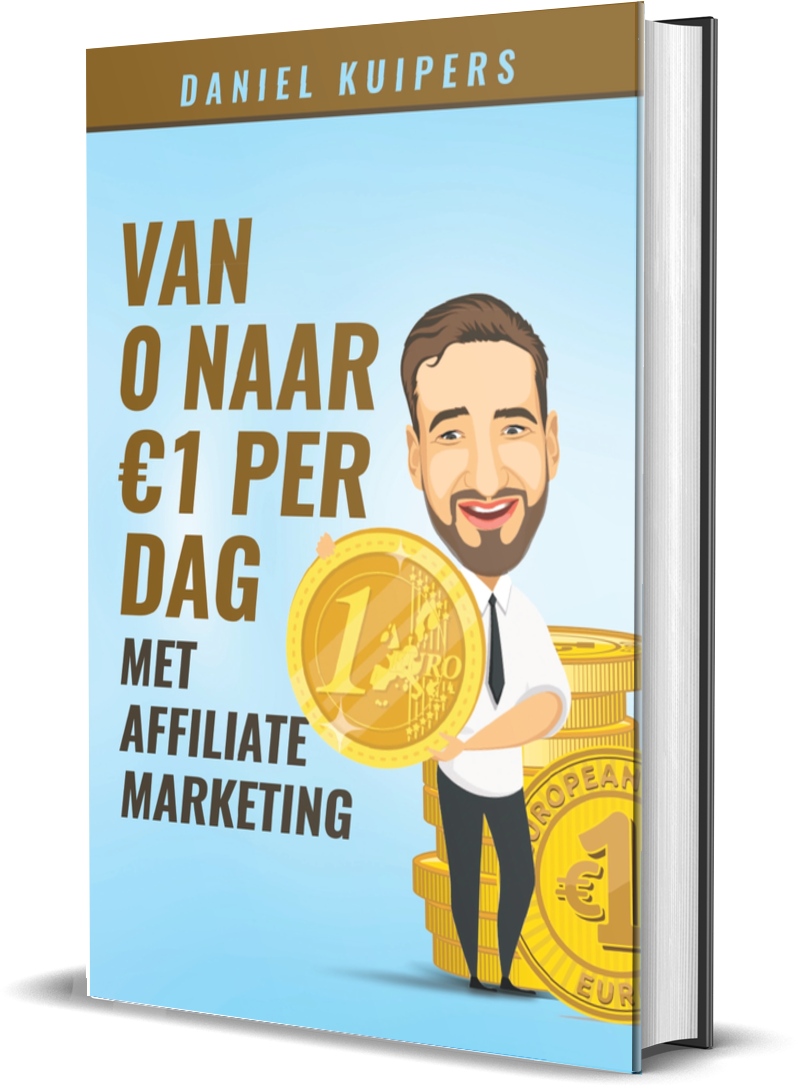

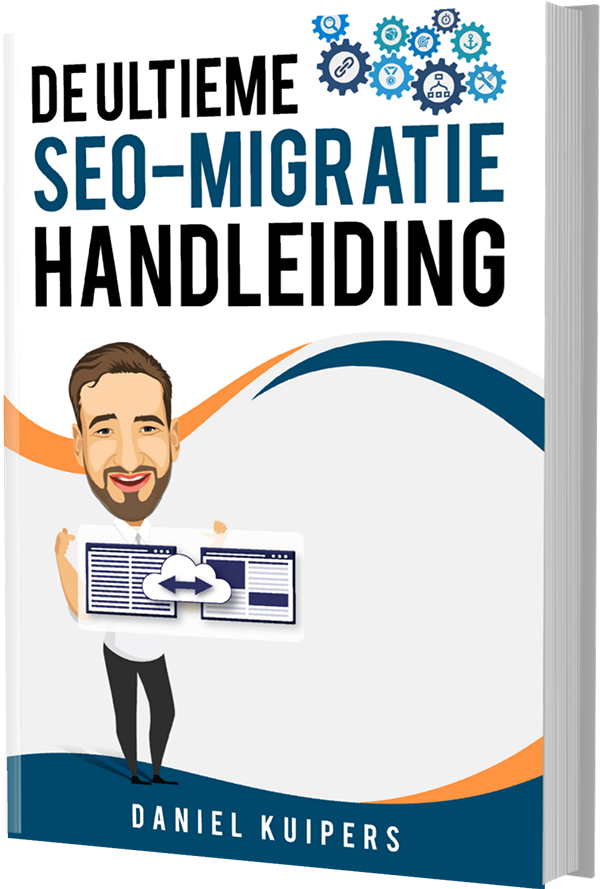

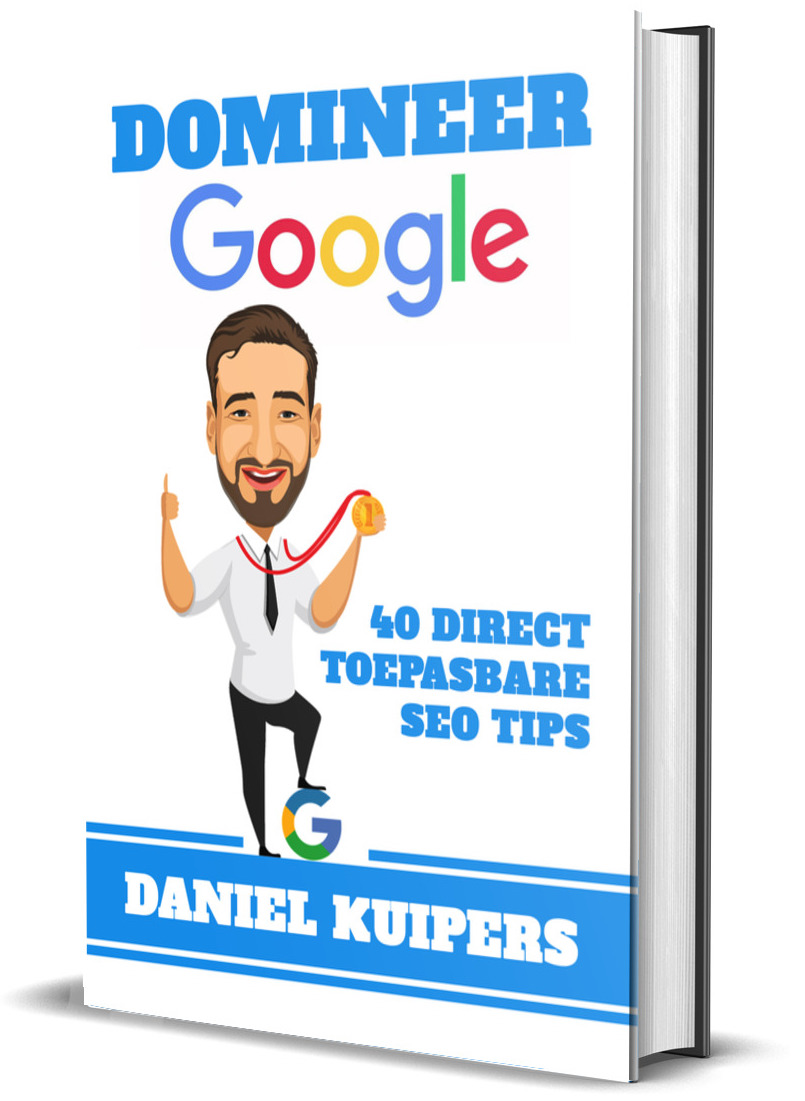
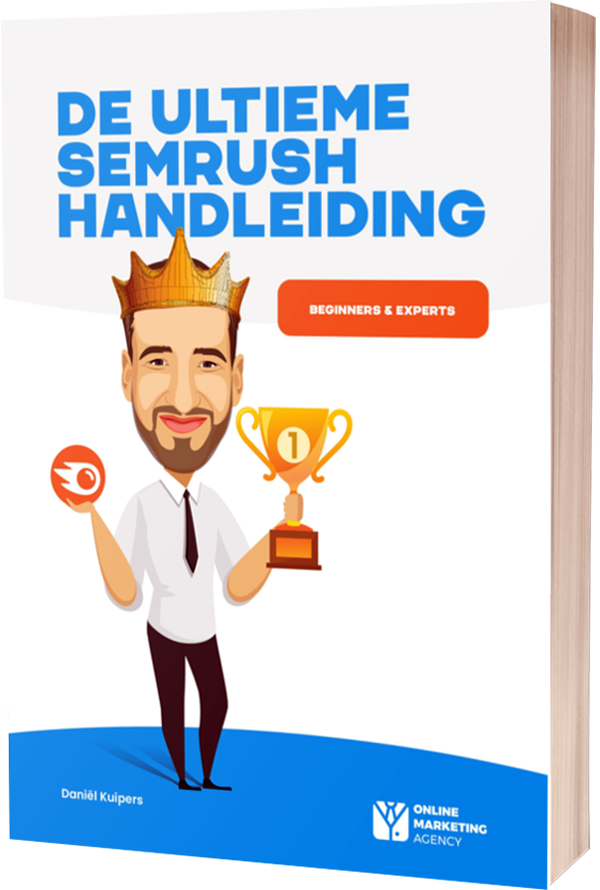

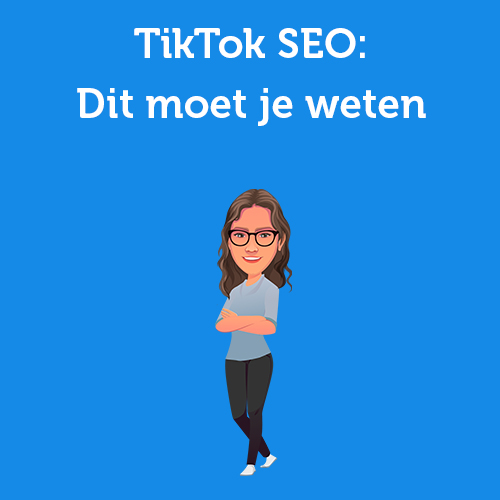
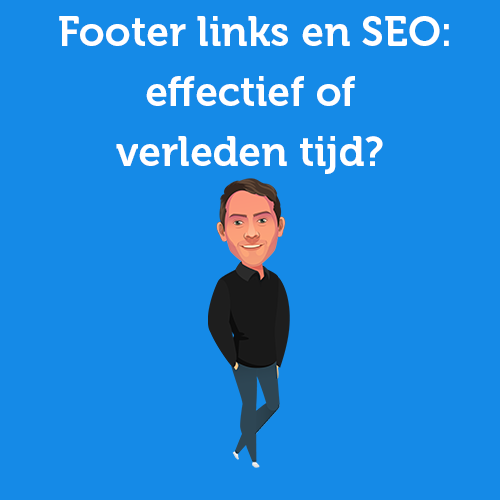
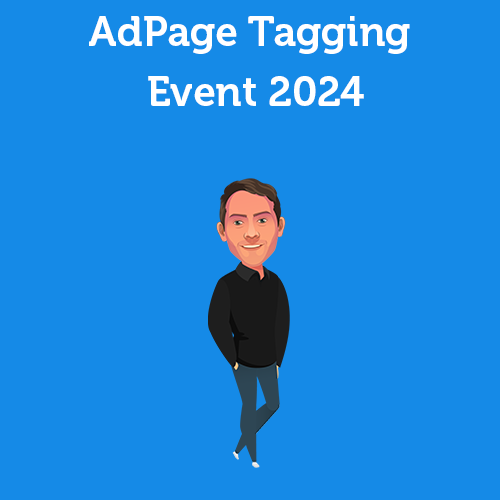
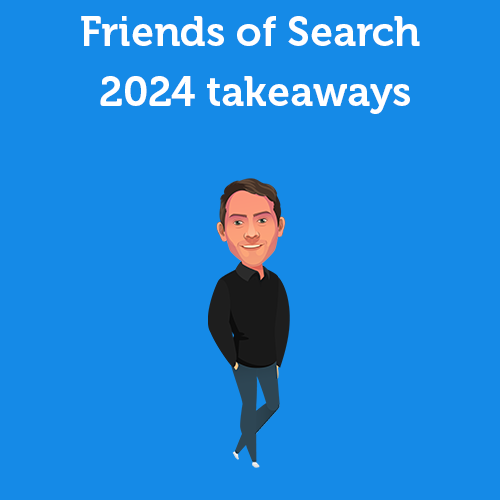
Written by: Daniel Kuipers
Daniel is the founder of Online Marketing Agency. He constantly scours the Internet for the latest gadgets and tactics and blogs about them in understandable language. Well, sometimes.